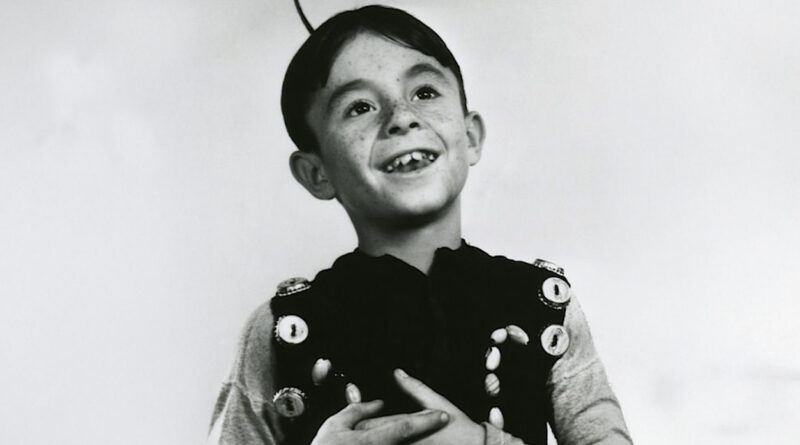The Murder of Teen Actor Carl “Alfalfa” Switzer in Los Angeles California
Carl Dean Switzer, affectionately remembered as “Alfalfa,” was one of the most recognizable child stars in early Hollywood history. Born on August 7, 1927, in Paris, Illinois, he rose to fame as part of the legendary “Our Gang” series, later known as The Little Rascals. His distinct cowlick hairstyle, off-key singing, and mischievous personality made him a fan favorite during the late 1930s and early 1940s.
Carl and his brother Harold were discovered by producer Hal Roach when the family visited California in 1934. The brothers had been performing in a restaurant when they caught the attention of studio staff. Carl was soon cast in Our Gang shorts, quickly earning his nickname “Alfalfa” due to his unique appearance and comedic style.
At the height of his popularity, Carl was adored by millions of moviegoers. His character was the quintessential all-American kid—sincere, awkward, and funny. Yet, as with many child actors of his era, his life after fame became increasingly difficult. Once the Our Gang films ended, Switzer struggled to find his place in the adult world of Hollywood.
Struggles After Stardom
When his career as a child actor faded, Switzer found it challenging to reinvent himself. The transition from child celebrity to adult performer proved nearly impossible. Casting directors remembered him as the freckle-faced troublemaker, not as a serious actor. He found small roles in films such as It’s a Wonderful Life and The Defiant Ones, but those appearances were minor compared to his former fame.
To make ends meet, Carl worked as a dog trainer, bartender, and hunting guide. Despite his talent and work ethic, he could not regain the same level of success he had once enjoyed as a child. Friends and associates described him as outgoing but sometimes hot-tempered, with a tendency to get involved in bar fights and financial disputes.
As his struggles grew, Carl became increasingly involved in odd jobs around Hollywood. Among these was breeding and training hunting dogs for wealthy clients. Ironically, one of those dogs would later be at the center of the dispute that ended his life.
The Dispute Over the Missing Dog
In late 1958, Carl Switzer trained a hunting dog belonging to a man named Moses “Bud” Stiltz. The dog went missing during a hunting trip, and Switzer felt responsible. Determined to make things right, he offered a reward of $35 for the dog’s return. A few days later, someone found and returned the animal, and Stiltz reimbursed Switzer for the reward money.
However, tensions between the two men escalated in the following weeks. Switzer believed Stiltz owed him additional money for the expenses he had incurred while searching for the dog. Stiltz, on the other hand, refused to pay anything beyond what he had already given. The disagreement simmered until January 21, 1959, when Switzer decided to confront Stiltz face-to-face.
The Night of January 21, 1959
On that fateful evening, Carl Switzer and a friend, Jack Piott, drove to Stiltz’s home at 10400 Columbus Avenue in Mission Hills, Los Angeles. The purpose of the visit was to collect what Switzer believed was owed to him. According to reports, Switzer knocked on the door and demanded repayment. The confrontation quickly turned heated.
During the argument, Switzer allegedly struck Stiltz with a clock or another object, leading Stiltz to grab a .38 caliber revolver. A struggle ensued, and the gun went off into the ceiling. Witnesses later testified that Stiltz then shot Switzer once in the groin at close range. The bullet severed a major artery, and Switzer collapsed to the floor. He died before medical help could arrive.
Police arrived to find Switzer’s body on the floor of the living room and Stiltz visibly shaken. He claimed he had acted in self-defense after Switzer threatened him with a knife. Investigators did find a penknife near Switzer’s body, but later accounts suggested that the knife was closed and may not have been used as a weapon.
The Inquest and Ruling
The case was brought before a coroner’s jury soon after the incident. Witnesses, including Stiltz and Piott, testified about the events of that night. Stiltz insisted that Switzer had been aggressive and that he feared for his life. The jury accepted his version of events and ruled the shooting as justifiable homicide.
For years, the official conclusion remained largely unchallenged. However, in later decades, conflicting accounts began to emerge. One of the most significant came from Tom Corrigan, Stiltz’s stepson, who had been present in the house at the time of the shooting. In a statement given many years later, Corrigan claimed that Switzer was actually leaving the home when Stiltz shot him. He described the shooting as unnecessary and said the so-called knife was nothing more than a small penknife found afterward.
Corrigan’s account painted a far different picture from the one accepted in 1959. If true, it suggested that Switzer’s death may have been closer to manslaughter than self-defense. Unfortunately, Corrigan’s testimony came decades too late to reopen the case.
A Fallen Star Remembered
Carl Switzer was only 31 years old when he was killed. His death shocked fans of Our Gang, many of whom had grown up watching his mischievous grin and comical antics on screen. He was buried at Hollywood Forever Cemetery, not far from other early film legends.
Though he had struggled in his later years, Switzer’s contribution to American cinema remains undeniable. The character of Alfalfa continues to be one of the most beloved figures in classic comedy, representing innocence, humor, and the awkwardness of childhood.
After his death, his story became a cautionary tale about the fleeting nature of fame and the hardships faced by child stars once the spotlight fades. Hollywood historians have since used his life as an example of the darker side of early stardom—the lack of guidance and the challenges of transitioning to adulthood after years of celebrity exposure.
The Enduring Legacy of “Alfalfa”
More than six decades later, Carl “Alfalfa” Switzer’s legacy endures in film history and pop culture. The “Our Gang” series remains a symbol of early American filmmaking, and Alfalfa’s character continues to bring laughter to new generations. Yet beneath the laughter lies a tragic story of a man who could not escape the shadow of his childhood fame.
The circumstances of his death remain controversial, a blend of personal misfortune, bad judgment, and perhaps an unjust ruling. Some view him as a victim of Hollywood’s neglect of its child actors, while others see his death as an unfortunate result of his own impulsive behavior. Regardless of perspective, Carl Switzer’s story serves as both a reminder of early Hollywood’s golden era and a warning about its unforgiving aftermath.
The murder of Carl “Alfalfa” Switzer on January 21, 1959, in Los Angeles, California, stands as one of the most tragic and haunting stories in entertainment history—a tale of a beloved child star whose laughter once filled movie theaters but whose life ended in violence and controversy.
Discover more from City Towner
Subscribe to get the latest posts sent to your email.




